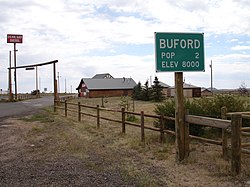Ronstar
Moderator Emeritus
House in Chicago MSA is a 54. Condo in Scottsdale is 87. Glad its in the poor side of town

You people are lucky. When I was a young boy we were too poor to have a zip code.
This reminded me of a place called Buford in Wyoming. It consists of 10 acres of land, had its own ZIP code of 82052, and its own post office that closed in 2004. During the construction of the Transcontinental Railroad, 2000 railroad workers called the place home.My zip is not in the data base!


I wonder if most of those are not Fed employed but rather: lobbyists, private sector contractors to government, doctors, lawyers (lots of these), etc....snip...
So, I clicked around and saw that while some areas inside DC proper are ranked as low as 13 and 23, there are so many ZIPs nearby, mostly in VA, being ranked at 99 with median income as high as $195K. I guess many of these are bedroom communities for federal workers and the beltway bandits.
...
The private sector companies doing contract work for the government are located around the beltway, hence are called the beltway bandits.I wonder if most of those are not Fed employed but rather: lobbyists, private sector contractors to government, doctors, lawyers (lots of these), etc.
We were thinking of going towards the Washington D.C. area for a vacation last summer but after looking at the congestion and pricing, decided to fly off elsewhere.
